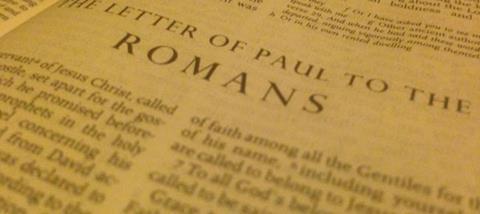
So what was the controversial interpretation in his original article?
David wrote:
Paul is sometimes regarded as heavy-handed about conformity because he didn’t want Christians to unnecessarily offend anyone with the wrong food or wrong headwear (1 Corinthians 8:9-13; 11:13-16). But he recognised that people have different experiences of sexuality. Paul himself preferred singleness and encouraged it, but he also accepted that marriage was good and, in fact, preferable for some who might fall into sexual immorality without it (1 Corinthians 7:8-9), although unfortunately he couldn’t bring himself to admit any other positives. He sums this up with the principle: ‘Let each person lead the life that the Lord has assigned to him, and to which God has called him’ (v17, ESV).
Even in Paul’s forceful anti-homosexual teaching, he still held to this principle. He criticised those who engaged in homosexual behaviour because they ‘exchanged natural relations for those that are contrary to nature’ (Romans 1:26, ESV). The word ‘exchanged’ implies that their original nature was heterosexual.
He doesn’t merely mean that they should have been heterosexual, because he later states that they already actively were heterosexual before they decided to try something different: ‘the men likewise gave up natural relations with women and were consumed with passion for one another’ (v27, ESV). In other words, the grossness of their sin lay in the way they acted contrary to their own nature; contrary to the life the Lord had assigned to them.
Andrew Wilson responded that he strongly disagreed with David's interpretation:
Paul uses alasso ormetalasso three times in a few verses (1:23, 25, 26), and in each of them he's talking about what the human race has done in turning away from what is fitting (God, true worship, godly sexual activity) to what is not (idols, false worship, ungodly sexual activity). A quick scurry through the heavyweight Romans commentators (Dunn, Moo, Schreiner, Jewett, Fitzmyer, Cranfield, Wright) showed that none of them were with DI-B on this, and I thought - given its significance for the whole gay debate - it was extremely unhelpful for him to have made that argument in a popular magazine without noting that it was both highly controversial, and widely rejected in contemporary scholarship. As you know, I often disagree with people about theology (!) and don't very often tweet strongly worded expostulations about them - and I really like David in the interactions I've had with him personally.
David Instone-Brewer responds:
I think Andrew has a good point that I should have said this exegesis is controversial. It is true that most interpret "nature" in Rom.1 as "nature in general", and not at "individual nature". Both meanings of Phusis are used by Paul (general nature in 1Cor 11:14 and perhaps Rom 2:14; individual nature in Rom 2:17 & Gal 2:15, and both uses in the same sentence in Rom 11:24), so it can be difficult to decide which he means. I think it is much more likely to mean 'individual nature' in Rom 1:26 because this aids Paul's argument, whereas 'general nature' gives his detractors a way out. If God is condemning people for choosing to go against their specific individual nature, then they are clearly guilty. But if they are going against general nature by following their individual nature, then they could reply that the fault lies at least partly with their creator. Seeing as Paul is trying to convince the reader of human sinfulness, it would be perverse of him to choose an example where a detractor could reply: But in this case, it is the creator who is at fault! Either way, Paul is not approving of homosexual behaviour. If he means 'individual nature', this gives Paul a stronger argument about human sinfulness by condemning hedonistic homosexual behaviour. But this means he is only specifically including those who have exchanged heterosexual for homosexual behaviour. If he means 'general nature', then this is a much clearer condemnation of all kinds of homosexual behaviour but it is a much weaker argument for human sinfulness. I can see that a modern interpreter might want to find a general condemnation of all homosexual activity in Paul's words, but that wasn't Paul's aim at this point. However, as Andrew says, most printed commentators do not point this out.
Feel free to add your thoughts in the comments section...


























